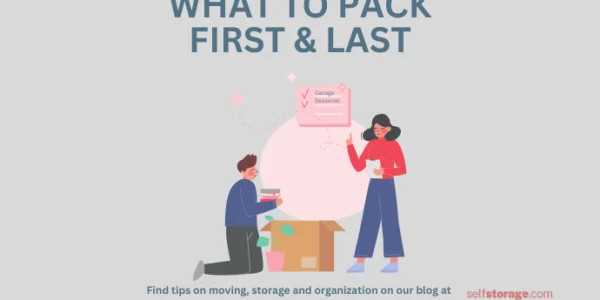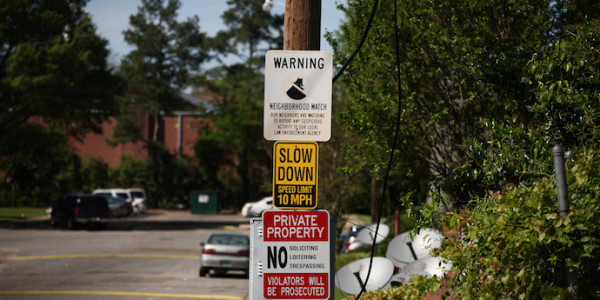Downsizing checklist for seniors – click on a link to learn more:
- Reasons For Downsizing Elderly Parents
- Plan and Evaluate the Seniors New Home
- Gather Important Documents
- Organize Documents
- Implement a Decluttering System
- Get Family Members Involved
- Consider Renting a Storage Unit
- Consider Having an Estate Sale
Say you visit your dad and find the house — a place once filled with laughter and memories — now seems too big, too empty. The garden, once his pride, has turned into a chore he can no longer manage. Or maybe, after a long chat with your mom, you realize her living costs are cutting deep into her savings, much faster than you’d thought. These moments can hit hard, signaling it might be time to help aging parents downsize.
Now, downsizing elderly parents doesn’t simply mean moving them to a smaller space; you are bound to get hit by big emotions and practical hurdles. Yes, the thought of sifting through years of belongings can feel overwhelming — for them and you. Let’s take it all one step at a time.
Reasons For Downsizing Elderly Parents
Here’s a story you might relate to, courtesy of orthopedic surgeon Barbara Bergin. At 68, she and her husband decided to leave their big house in Austin for a retirement neighborhood. With the kids all grown up, the space they once needed felt too vast. “We wanted to simplify our lives,” she said. “The thought of my children having to sift through our things someday made downsizing now seem like the right choice.” And her 90-year-old parents decided to do the same!
Your reasons for downsizing elderly parents might be different but the process will all be pretty much the same. Here’s what could tip the scale for you:
- The house has become too big, as in Bergin’s case. The truth is, as we age, a large home can become more of a burden than a sanctuary. Physical limitations might make it tough to manage maintenance and cleaning.
- The cost of living is too steep. Whether it’s utilities, taxes or upkeep, downsizing helps cut costs in all these areas. This welcome financial relief leads to a more manageable lifestyle on a fixed income.
- There are health concerns. Difficulty managing medications or roaming through a large home can prompt a move to a more suitable living environment, one that’s safer and closer to medical care.
Important note: Moving in later life often marks a major transition, acknowledging challenges like frailty or the loss of independence. So, when helping seniors downsize, make sure you explain all the reasons clearly and patiently, turning a potentially unwelcome change into a positive new chapter. For instance, mention it’s a great opportunity to reduce daily chores. Who would say no to that? Or suggest that they will make more social connections, that helps too.
Plan and Evaluate the Seniors New Home
The first step when downsizing elderly parents is finding the right new home and you do that by matching their needs with the right environment. First up, think about what they really need.
- Will they require help with day-to-day tasks?
- How about easy access to medical care?
- Will their furniture fit properly? — You may not have thought of this last one, but Susan Williams, an RN & senior health contributor at Retirement Being, has seen it all. “Furniture that fits well in a larger home might be cumbersome in a smaller apartment. Measure spaces and furniture in advance to ensure a comfortable fit,” she pointed out.
Thankfully, the choices of living arrangements are plenty, from independent living communities for those who need minimal assistance to assisted living for those requiring more hands-on care. And then there are retirement communities, offering a bit of everything.
Each option has its vibe, its set of amenities, and, yes, its price tag. Walk through these options with your parents, weighing the pros and cons of each based on their current and anticipated needs.
Now, let’s talk numbers. If your parents are on a fixed income, moving can have a big impact on their finances. Sit down and crunch those numbers, considering the costs associated with different living arrangements.
- Can they afford the place they like?
- Will they need financial help from family members?
Planning can prevent financial stress down the line. In fact, it can prevent stress altogether, and Bergin’s experience speaks volumes: “We didn’t do this in a weekend. We spread it out over a few months where there’s no rushing.” Take this to heart. A rushed move is a stressful move. Give yourself and your parents the gift of time.
Gather All Important Documents
As you go through your parent’s home, you must keep an eye out for important documents, like:
- Medical records for easy access during health emergencies or routine check-ups.
- Legal documents, including wills, to make sure property and personal wishes are respected.
- Financial information to keep on top of assets, liabilities, and daily expenses.
And, of course, those personal documents that tell the story of a life lived:
- Birth certificates and Social Security cards to confirm identity.
- State IDs or driver’s licenses to keep them legally recognized and mobile.
- Insurance paperwork to ensure they’re covered, come what may.
- Marriage certificates and house deeds tie them to their history and achievements.
Organize Documents
Sure, going through all these documents can seem a tad intimidating, but it doesn’t have to be. Start by categorizing them based on type — medical, financial, legal, personal. See what you can digitize to reduce physical clutter — secure cloud storage or a dedicated USB drive can serve as good digital safe spots.
For the originals, invest in a fireproof and waterproof file cabinet or safe and let key family members know where these documents are kept.
Pro tip: Later, as you progress with the decluttering and actual moving, don’t overlook the importance of updating address changes and ensuring accounts like banks, Medicare and Social Security reflect the new residence.
Implement a Decluttering System
Decluttering starts with an understanding of the 80/20 rule: Most of us use only about 20% of our belongings regularly. The rest? They’re just taking up space.
With that in mind, you can plan how you will separate the junk from the rest while watching for items with sentimental value. Decide which rooms to start with first, if you’ll work from side to side or top to bottom, and how you’ll sort all the items to speed through the decluttering process.
Bergin, for instance, found success using this simple yet effective system: “Each room I went through, I had three bins: one for the items I’m going to keep, one for selling at a garage or estate sale, and one for throwing items away.” For larger items like furniture, she used builder’s tape color-coded for each category.
With everything categorized, start the process of eliminating the clutter. Donate items that can still be used, sell those of value and responsibly dispose of the rest. Take photos of items with sentimental value that didn’t make the “keep” cut, as a way to preserve the memories without the physical clutter.
Get Family Members Involved
One of the key tips for downsizing for seniors is to get family members involved. This way, you make it easier on yourself and transform the whole process into something more manageable, filled with memories and teamwork. Plus, open discussions and family meetings allow everyone to be on the same page.
Pay special attention to heirlooms and memorabilia, as this can be a very sensitive subject. “One important aspect that’s often overlooked is the emotional attachment seniors have to their possessions,” Williams reminded us.
The physical act of moving items has this whole other layer of helping them manage emotions when parting with belongings that hold memories. Approach these items with care and have conversations about which items should stay within the family and how they should be distributed.
And another thing: Bergin recommends sorting through belongings as an exercise to get to know your parents. “It was a wonderful experience to do with my mom,” she said. “We did not have a single argument and if she gave me pushback on something, we kept it.”
Use the process as an opportunity for bonding, encouraging your parents to share stories about their items. “As people get older, you won’t normally have a reason to sit down with your parents and say, ‘tell me about your life,’” Bergin continued. “My parents have some great memories. Because we were looking at little things, it would jog my mom’s memory about a specific event.”
Consider Renting a Storage Unit
Sometimes, even after decluttering, you’ll find items that neither fit the new home nor are they things you’re ready to let go of. The answer to that could very well be renting a storage unit.
Before you get to this step, take another hard look at what’s left. There might still be things you might just want to dispose of, others that can be donated, plus you could sell some items and make an extra buck.
You’ll also want to weigh the cost against the sentimental or financial value of the items. Ask yourself: Is the cost of storage justified? Will these items be needed or used in the foreseeable future? Not everything needs to end up in a storage unit or sold, after all. “Consider digitizing memories. Photos, letters and even artwork can be scanned and saved electronically, reducing physical clutter while preserving precious memories,” Williams suggested.
Consider Having an Estate Sale
An estate sale is a practical option for clearing out. You just have to get high-value items, like artwork and jewelry, evaluated by an appraiser, and then set the price for the remainder. It’s a way to handle bulk items without needing to individually cart them off to consignment shops or auctions. You can also put your loved ones’ belongings you want to keep in a storage unit. After that, you just have to get estate sale companies to run the event for you or do it yourself. But be cautious if you take this route. “Realize that you’re never going to get the true value of that item or what you thought it was worth,” Bergin stressed.
Helping Seniors Downsize
Yes, there will be some logistical hurdles and emotional landscapes that are inherent to such a significant transition, but now you know how to help aging parents downsize and you’ve got this.
From the initial realization that it’s time to downsize, to finding the right new home, to the meticulous sorting of a lifetime’s possessions, each step requires a healthy mix of practical strategies and a deep well of emotional support.
After all, while possessions may fill a home, it’s the memories and love that truly make a life. “My biggest tip is to treat them with kindness and a sense of humor. It’s the best way to get through it so you don’t get into fights, because at the end of the day they’re just things,” Bergin added.
So, when downsizing elderly parents, approach each step with patience, empathy and careful planning. Encourage open conversations, share in the reminiscence of past memories and together, look forward to the new memories yet to be made.





